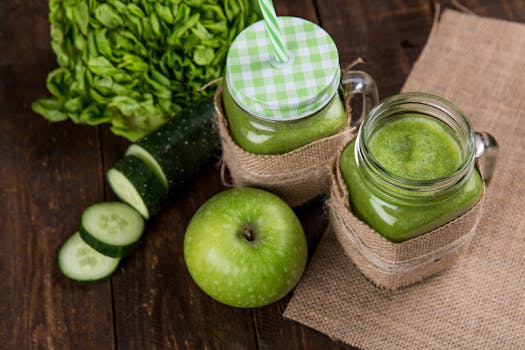Contact Us (720) 964-1335 or (901) 675-6125

Introduction
Green smoothies have become the go-to for anyone aiming to improve nutrition, detox, and support weight loss. They’re an easy way to pack in greens, fruits, and superfoods while on the go, making them especially popular among those looking to shed pounds. However, could your daily green smoothie be causing harm instead of helping? Specifically, is there a hidden risk in your ingredients that you need to be aware of?
If you’re focused on weight loss, whether you’re using GLP-1 medications or not, it’s crucial to understand the balance between the benefits and the potential risks. One ingredient you may not be considering is oxalates, a naturally occurring compound that can be a concern when consumed in excess.
What Are Oxalates and Why Do They Matter?
Oxalates are naturally occurring compounds found in many plant-based foods, particularly in leafy greens like spinach, beet greens, and Swiss chard. While oxalates are not harmful in small amounts, they can cause issues when consumed in high quantities.
When oxalates build up in the body, they may lead to several health concerns, including:
- Increased risk of kidney stones: Oxalates can bind with calcium to form crystals, which may contribute to kidney stone formation.
- Impaired calcium and magnesium absorption: High oxalate levels can block the absorption of essential minerals like calcium and magnesium.
- Joint pain or inflammation: Some individuals may experience inflammation or discomfort, especially if they are prone to conditions like arthritis.
- Digestive discomfort: High-oxalate foods can irritate the digestive tract in sensitive individuals, leading to bloating, gas, or other issues.
If your daily smoothie includes large quantities of high-oxalate ingredients like raw spinach or almond milk, you may be unknowingly taxing your body with these compounds.
So, Are Green Smoothies Bad?
Not at all—green smoothies can be incredibly healthy and beneficial when made with a thoughtful approach. The key to reaping the benefits while avoiding potential pitfalls is to create a balanced, varied smoothie routine that avoids excessive oxalate intake.
To make your smoothie a weight loss asset, not a hindrance, follow these tips:
- Rotate your greens: Use lower-oxalate greens like romaine, arugula, bok choy, or zucchini instead of spinach and Swiss chard.
- Add protein: Incorporate a scoop of Greek yogurt, plant-based protein powder, or collagen to keep you full and support muscle recovery.
- Include healthy fats: Add chia seeds, flaxseed, or avocado for essential omega-3s and healthy fats to support metabolism.
- Limit fruit sugars: While fruit provides vital nutrients, try not to overload your smoothie with sugary fruits. Stick to smaller portions like half a banana or a handful of berries.
Who’s Most at Risk?
Some people are more susceptible to the negative effects of oxalates, especially when they’re consumed daily in large quantities. Here’s who should be more cautious:
- Women with a history of kidney stones: If you’ve had kidney stones in the past, consuming high-oxalate foods could increase your risk of developing more.
- People with digestive issues: Conditions like IBS or inflammatory bowel disease (IBD) may worsen with high oxalate intake.
- Those using GLP-1 medications: These medications can impact nutrient absorption, making it even more important to ensure your body is getting the right balance of vitamins and minerals.
- Anyone on a repetitive diet: Eating the same foods day after day can create imbalances in your nutrient intake, including oxalates.
If you’re concerned about how oxalates may be affecting you, working with a wellness coach can help. At Ample Health & Wellness, we assess your routine and suggest practical adjustments to keep you feeling your best.
How Ample Health & Wellness Can Help
At Ample Health & Wellness, we understand that weight loss is not just about what you eat—it’s about how you eat. Our approach includes:
✔️ Personalized nutrition plans: We help you assess your diet and make smart food choices that support your weight loss journey.
✔️ Food rotation and anti-inflammatory guidance: We teach you how to rotate your greens and reduce inflammation through a balanced diet.
✔️ Customized smoothie recipes: Whether you’re aiming for weight loss, muscle recovery, or better digestion, we’ll create smoothie recipes that meet your specific needs.
For those using GLP-1 medications, we also offer support on how to optimize digestion, absorb nutrients effectively, and minimize side effects, so you can achieve long-term success.
Final Thoughts
Green smoothies can absolutely support your weight loss goals when made with care. If you find that your smoothies are packed with high-oxalate ingredients like raw spinach and almond milk, it may be time to rethink your blend. Focus on moderation, variety, and nutrient balance to enjoy the benefits without any unwanted drawbacks.
At Ample Health & Wellness, we’re here to guide you every step of the way, helping you tailor your smoothies and overall diet to work in harmony with your body’s needs.
References
Noonan, S. C., & Savage, G. P. (1999). Oxalate content of foods and its effect on humans. Asia Pacific Journal of Clinical Nutrition, 8(1), 64–74.
Holmes, R. P., & Assimos, D. G. (2004). The impact of dietary oxalate on kidney stone formation. Urological Research, 32(5), 311–316. https://doi.org/10.1007/s00240-004-0432-2
Massey, L. K. (2007). Food oxalate: Factors affecting measurement, biological variation, and bioavailability. Journal of the American Dietetic Association, 107(7), 1191–1194.
